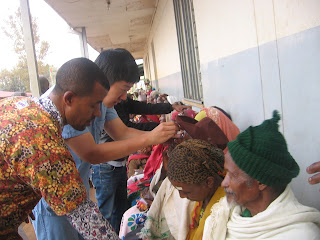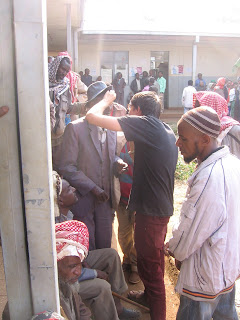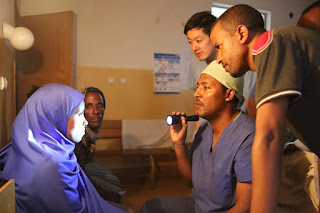By 10 am the first morning of the eye camp, Dr. Samuel was finishing a cataract surgery under the light of a flashlight I held about a foot above the patient's eye. The electricity had gone out and with it the microscope and light typically used for the surgery. Rather than leave the patient's eye open, Dr. Samuel had elected to finish under the rudimentary illumination.
Patients waiting to be seen
The clinic was a frenzy of activity as Mitiku and Tamene evaluated and treated patients for their eye conditions, Ato ("Mr." in Amharic) Getahoon prepped patients for surgery, Challa and Sister Almaz dispensed medications and collected payments, and Desi ran back and forth from the "operating room," collecting surgical equipment to be sterilized and returning clean equipment. All the while, the pressure cooker serving as sterilizer emitted a high-pitched hum from the corner of the clinic.
Meanwhile, in the makeshift operating room next door, Dr. Samuel pumped out the cataract surgeries while scrub nurse Ebise stood for long hours assisting Dr. Samuel and circulating nurse Sehai prepped any and all surgical materials necessary.
A patient with a lipoma in his cheek being prepped for cataract surgery
Desi prepping the surgical equipment for sterilization
Ophthalmic nurse Mitiku evaluating a patient for glasses
The eye camps are a collaborative effort made by Dr. Samuel- a Mekane Yesus (Ethiopian equivalent of Lutheran) ophthalmologist from Ethiopia, the Daughters of Charity- an order of nuns focused on serving the poor who had historically been responsible for much of the eye care in western Ethiopia, Dr. Larry Thomas- an American doctor who raises awareness and support for Ethiopia/the eye camps, and Dr. James Guzek- an American ophthalmologist practicing in Washington.
Removing eye patches the first day after cataract surgery
Dr. Samuel evaluating a patient's eye the day after surgery
Putting in post-op eye drops
Dr. Samuel putting eye drops in an albino patient's eye after surgery
Ophthalmic nurse Tamene and Sister Almaz putting drops in patient's eyes after surgery
Mitiku telling patients "Praise God" for successful cataract surgeries and giving instructions on post-op eye drops
Tamene evaluating patients for operable cataracts
Luke screening patients for cataracts
Mitiku evaluating the eye problems of an anxious baby
People crowding the door to the clinic to try to be seen
By mid-day/afternoon, after spending a few hours waiting in the heat patients would be pushed up against the door of the clinic, eagerly waiting to be seen and evaluated.
The crowd of patients waiting to be seen never seemed to decrease
Watching Dr. Samuel perform cataract surgery
A man who had been blind for many years smiling at his restored sight
Luke and his "son" who followed him everywhere
One of Dr. Samuel's most challenging cases was a woman with bilateral cataracts who also had psychiatric issues. While lying on the operating table, she refused to keep her head still, and Dr. Samuel feared that if he opened her eye the worst case scenario would be vitreous and retina (contents of the back of the eye) coming out! I was sweating bullets as I struggled to hold the patient's head still, and her son pinned her arms down so she couldn't touch her eye. Thankfully, Dr. Samuel was able to complete the surgery successfully and the next morning found that she had a good visual outcome.
The patient with psychiatric issues on the first day after surgery- she swore that the previous day I had been a black man who was smoking cigarettes
At the close of each day, after all the cataract surgeries were finished, Dr. Samuel would see and evaluate the patients whose cases Mitiku and Tamene were unsure about. Everyone would gather around Dr. Samuel as he figured out the patient's diagnosis and explained the mechanism and treatment for their condition. It reminded me of "rounding" on rotations, when all of us students would join the residents and attending to see patients and glean pearls of knowledge from the attending.
"rounding" at the end of the day (photo cred: Luke Sherman)
kids who lived at the clinic
Luke and I ended up leaving the eye camp a day early so I could make my flight back to Zambia, but by the end of the camp Dr. Samuel had completed 260 cataract surgeries. Many of the patients had been blind, with cataracts in both eyes and we had had the opportunity to see them leaving the clinic grounds, confidently going back into the world with a new lease on life.

























great post cam!
ReplyDeleteYour photos make the experience come to life for me! "The crowd of patients waiting to be seen never seemed to decrease" reminds me of what Verghese writes in his "Cutting for Stone" that home is where we are wanted. Through what you share and what I experienced at Mekelle University/Ayder Referral Hospital, I see how rewarding it is to serve in a place where there are people in great need. I don't remember any of my patients reacting how yours did (with the hand-licking and singing) when I was in the peds and internal medicine wards... I'll have to see that one day ;)
ReplyDeleteThanks for sharing us. lasik Michigan
ReplyDelete